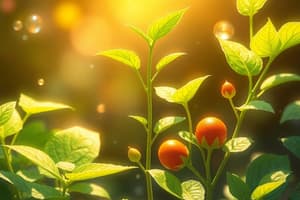Podcast
Questions and Answers
What is the primary source of energy for most animals?
What is the primary source of energy for most animals?
- Carbohydrates (correct)
- Vitamins
- Fats
- Proteins
Why must animals obtain certain amino acids from their diet?
Why must animals obtain certain amino acids from their diet?
- To synthesize fats
- To aid in the absorption of fat-soluble vitamins
- To provide insulation
- Because they cannot produce those amino acids (correct)
What is the role of fats in animals' bodies?
What is the role of fats in animals' bodies?
- Insulation from cold weather
- Building blocks for cell membranes (correct)
- Assist in digestion of carbohydrates
- Primary source of energy
Which nutrient is essential for the growth, maintenance, and regulation of body processes in animals?
Which nutrient is essential for the growth, maintenance, and regulation of body processes in animals?
Why do some animals need enzymes to digest complex carbohydrates like cellulose?
Why do some animals need enzymes to digest complex carbohydrates like cellulose?
Which nutrient is responsible for repair, growth, and maintenance of body tissues in animals?
Which nutrient is responsible for repair, growth, and maintenance of body tissues in animals?
What is the main purpose of the specialized stomachs in herbivores and detritivores, like ruminants?
What is the main purpose of the specialized stomachs in herbivores and detritivores, like ruminants?
What elements do plants primarily obtain from carbon dioxide and water?
What elements do plants primarily obtain from carbon dioxide and water?
Which essential nutrient is not absorbed by plants through their root systems?
Which essential nutrient is not absorbed by plants through their root systems?
What is the role of chlorophyll in plants?
What is the role of chlorophyll in plants?
How has science contributed to nutrition in animals and plants?
How has science contributed to nutrition in animals and plants?
Why is a balanced diet important for animals and plants?
Why is a balanced diet important for animals and plants?
Study Notes
Science and Nutrition: Unraveling the World of Animals and Plants
From the microscopic realm of cells to the vast expanse of ecosystems, science has delved deeply into the intricate world of nutrition that sustains both animals and plants. As we explore the exciting frontiers of these fields, we discover the interconnected web of life that binds them together.
Nutrition in Animals
Animals derive their nutrients from food, whether it's herbivores grazing on plants or carnivores consuming other animals. Basic nutrient requirements for animals include proteins, fats, carbohydrates, vitamins, and minerals.
- Proteins: Essential for growth, repair, and maintenance of body tissues. Animals cannot synthesize all amino acids, so they must obtain them from their diet.
- Fats: Provide energy, insulation, and serve as building blocks for cell membranes. Fats also aid in the absorption of fat-soluble vitamins.
- Carbohydrates: The primary source of energy for most animals. Simple sugars like glucose are readily available, while complex carbohydrates like cellulose in plants require enzymes for digestion.
- Vitamins: Essential for various physiological functions. Animals cannot synthesize several vitamins and must obtain them from their diet.
- Minerals: Essential for growth, maintenance, and regulation of body processes.
The digestion and absorption of nutrients in animals involves a series of complex processes, primarily in the gastrointestinal tract. Herbivores and detritivores, like ruminants, have specialized stomachs to break down plant matter and extract nutrients. For example, cows possess rumens, where microorganisms ferment plant material, releasing essential nutrients.
Nutrition in Plants
Plants produce their own food through photosynthesis, utilizing sunlight, carbon dioxide, and water. They store some energy in the form of glucose and convert excess glucose into starch or other complex carbohydrates for later use. Plants, too, require various nutrients, which they absorb from the soil.
- Nutrient uptake: Plants take up essential nutrients like nitrogen, phosphorus, potassium, calcium, magnesium, and sulfur through their root systems.
- Carbon, hydrogen, and oxygen: Plants obtain these elements from carbon dioxide and water.
- Light: Plants require sunlight to carry out photosynthesis.
Plants synthesize their own proteins, fats, carbohydrates, vitamins, and minerals. Intricate pathways within cells orchestrate the production of these nutrients. For example, plants produce chlorophyll, the pigment that absorbs light energy during photosynthesis.
The Role of Science in Nutrition
Science, through research and experimentation, has greatly advanced our knowledge of nutrition in animals and plants. Scientists have:
- Identified the nutrient requirements of various organisms.
- Discovered the complex processes involved in digestion and absorption of nutrients in animals.
- Investigated the mechanisms of photosynthesis in plants.
- Explored the role of nutrients in maintaining health and well-being.
- Provided evidence-based guidelines for nutrition in animals and humans.
In addition, science has shed light on the consequences of nutrient deficiencies and the importance of a balanced diet. For instance, vitamin A deficiency can lead to night blindness, while a lack of certain nutrients can impair growth and reproduction in animals and plants.
Conclusion
As science delves deeper into the intricate world of nutrition, it reveals the interconnected web of life that sustains animals and plants. Understanding the basics of nutrition in animals and plants allows us to appreciate the incredible complexity of ecosystems and the delicate balance they maintain. This knowledge empowers us to make informed decisions about what we eat and how we care for the environment. As we continue to build upon this foundation of knowledge, the future of science and nutrition promises to be an exciting and important frontier for exploration.
Studying That Suits You
Use AI to generate personalized quizzes and flashcards to suit your learning preferences.
Description
Explore the interconnected world of nutrition in animals and plants, from the basic nutrient requirements to the complex processes of digestion and absorption. Learn how science has advanced our understanding of nutrient uptake, photosynthesis, and the role of nutrients in maintaining health and well-being.




